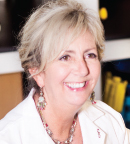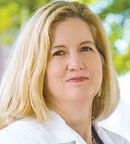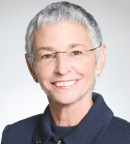In December, The University of Texas at Austin Dell Medical School will launch an innovative cancer care model called the CaLM (cancer life re-imagined) Clinic as part of its new cancer center, the Livestrong Cancer Institutes. The goal of the Livestrong Cancer Institutes and the CaLM Clinic is to provide a holistic approach to caring for patients with cancer from their initial cancer diagnosis and treatment throughout survivorship, including palliative and supportive care.
With a $50 million commitment from the Livestrong Foundation, the Livestrong Cancer Institutes aspire to reinvent care for patients. They aim to achieve this goal by establishing universal standards and resources for survivors, identifying gaps in care for underserved patient populations, and developing best practices in cancer care and in the delivery of that care using a multidisciplinary team–based approach for each patient.
The CaLM Clinic concept of survivorship care is designed to provide patients with a central clinical home; high-acuity, subspecialty clinical care as needed; and access to clinical trials and the latest research to improve patient outcomes.
The ASCO Post talked with two leaders overseeing the development of the Livestrong Cancer Institutes and the CaLM Clinic—S. Gail Eckhardt, MD, FASCO, Director and Associate Dean of Cancer Programs of the Livestrong Cancer Institutes, and Elizabeth Kvale, MD, MSPH, Program Leader for Survivorship and Supportive Care of the Livestrong Cancer Institutes at The University of Texas Austin Dell Medical School—about the program’s goals and its potential impact on survivorship care.

S. Gail Eckhardt, MD, FASCO

Elizabeth Kvale, MD, MSPH
Evaluating the Benefits of Palliative Care
What are the benefits of the CaLM concept in palliative and supportive care?
Dr. Eckhardt: Our mandate for the development of the Livestrong Cancer Institutes and the CaLM Clinic is to ensure that any clinical operation we design and employ integrates patient-centered care into the program. Elizabeth Teisberg, PhD, and Scott Wallace, JD, MBA, two faculty members at the Dell Medical School leading the Value Institute for Health and Care, have developed three categories of outcomes that define health-care success: capability (the frequency or degree to which cancer survivors can maintain a quality lifestyle); comfort (the freedom from physical and emotional pain); and calm (the ability of patients to live their lives as they undergo care).
“The challenge for cancer centers is to figure out how to operationalize access to palliative care from the point of diagnosis and throughout survivorship.”— Elizabeth Kvale, MD, MSPH
Tweet this quote
The term “calm” is related to the chaos and disruption in patients’ lives that often surround health care. Thus, we selected this term to be used in the design of our new cancer clinic.
I’ve been a medical oncologist for almost 25 years, and during that time, I’ve seen a shift in treating cancer from its being an often-incurable disease to a manageable chronic disease. I would often see patients monthly for years for treatment and assessment of disease progression or no disease progression and then refer them for palliative care. But not a lot of attention was focused on how well the patients were able to live their day-to-day lives, and that’s how the CaLM Clinic concept came about.
Dr. Kvale: The challenge for cancer centers is to figure out how to operationalize access to palliative care from the point of diagnosis and throughout survivorship—making that care available to patients. One of the benefits of starting a program like ours from the ground up is that we get to make palliative care the front door of our cancer treatment program, which doesn’t happen in our current health-care system.

Jamie H. Von Roenn, MD, FASCO
Every patient in our program is automatically assessed by our CaLM triage SWAT team, which typically includes an oncology physician assistant or nurse practitioner, social worker, and palliative care specialist. Patients needing palliative care services can then access that care in a way that is efficient and cost-effective. We anticipate this will drive improved outcomes for our patients, including better quality of life.
GUEST EDITOR
Addressing the evolving needs of cancer survivors at various stages of their illness and care, Palliative Care in Oncology is guest edited by Jamie H. Von Roenn, MD, FASCO. Dr. Von Roenn is ASCO’s Vice President of Education, Science, and Professional Development.Is every patient who comes to the CaLM Clinic automatically evaluated for palliative care services?
Dr. Eckhardt: All patients are automatically evaluated for all comprehensive, patient-centered clinical and supportive ambulatory services, and their care is coordinated by the SWAT team. For example, when new patients come to the clinic, they spend the initial visit with a variety of specialists, including a disease-focused medical oncologist and a multidisciplinary team of other health-care professionals, such as surgeons and radiation oncologists.
This medical team then discusses and develops a comprehensive treatment plan in collaboration with the patient. But the whole-person plan does not stop there. Patients are also evaluated for their other care needs, including emotional, mental, and behavioral support; financial counseling; fertility preservation; integrative therapy; genetic counseling; nutritional guidance; physical therapy; fitness; palliative care; and symptom management. Then the SWAT team meets with the patients to debrief them on their diagnosis and treatment plan and ensures that they understand what those plans entail and address any concerns patients may have. The treatment plan and subsequent palliative and supportive care services are then deployed in the CaLM core clinic.
Improving Patient Outcomes
Will having this kind of comprehensive patient-centered service improve not just the quality of care patients receive but their outcomes as well?
Dr. Kvale: Yes, it will. We know palliative care improves patient outcomes, but most patients are never referred to palliative care or assessed for their total cancer care needs, and there is a high likelihood of missed opportunities for improving care. In the CaLM Clinic, we are proposing a systematic redesign of oncology care to make access to palliative and supportive care available to every patient.
“In the CaLM Clinic, we are proposing a systematic redesign of oncology care to make access to palliative and supportive care available to every patient.”— Elizabeth Kvale, MD, MSPH
Tweet this quote
Dr. Eckhardt: Many palliative care programs in cancer centers focus on the inpatient side. At my prior institution, even though we had an amazing palliative care program, it could not handle much capacity on an outpatient basis, and currently that’s where a huge percentage of patients receive most of their care.
As I mentioned earlier, in the CaLM Clinic, the SWAT team meets with every patient and refers them to specialists who assess their specific cancer type and provide high-acuity, subspecialty clinical care. We think of it as a “flipped clinic,” in which the SWAT team provides the upfront care, and patients are referred back to the specialists periodically for treatment planning and assessment.
For example, phase I of the launch of our outpatient program will focus on patients with gastrointestinal and gynecologic cancers, because all the physicians who are expert in those cancers are now in place. We will add specialists in other disease types as we complete all phases of the program. We think of the subspecialists as medical “plug-ins” to the CaLM Clinic.
Integrating Palliative Care in Community Practices
How can this approach be adopted in other oncology practices, especially those in community settings?
Dr. Eckhardt: Part of our mission is to track health-care cost-efficiency and determine, for example, the appropriate staffing requirement per patient diagnosis. As a start-up medical school, we have to negotiate our provider contracts. Currently, they are all fee-for-service, but we hope to move to a more bundled, value-based payment model in the future.
What we are hearing uniformly from payers is that they want to see higher efficiency and lower costs in cancer care. When you look at the community practice setting, where oncologists are being slammed by higher patient volume, their costs are going up because they have to keep hiring more staff to handle the increased patient volume.
We expect our CaLM Clinic model to reduce costs because we will be operating across several specialty fields and sharing those provider resources. Since medical oncologists will actually be focused on providing exceptional medical care within a multidisciplinary team that is concentrated on patients’ needs, resources will be more efficiently utilized, and costs should come down.
More importantly, patients will have access to ongoing—not just episodic—core survivorship and palliative care services. Depending on the size of the clinic, this will either reduce the costs of specialty providers or facilitate the intake of new patients.
Dr. Kvale: We will be collecting all relevant data that will allow us to analyze cost and patient outcome and evaluate the potential savings and clinical benefits. But we think this care model will really help smaller practices become more efficient in terms of both cost and patient care.
Dr. Eckhardt: Components of our patient services will include fertility preservation and the issue of financial toxicity— two areas that are often overlooked in a typical office visit. We are also developing a separate program for young adult patients, aged 18 to 39, which will be another specialty plug-in at the CaLM Clinic. We are designing separate spaces for these young adult patients and will be testing specific services for them based on their unique care needs.
At the center of our CaLM Clinic program, for all patients, is the embrace of palliative care across the whole continuum of cancer care, not just at the end of life. Our goal is to provide comprehensive patient-centered wraparound care for patients from the moment of diagnosis through the posttreatment transition to long-term survivorship, so that cancer doesn’t derail patients from living their best possible lives. ■
DISCLOSURE: Dr. Eckhardt is a consultant/advisor with CASI Pharmaceuticals, OnKure, Champions Biotechnology, and SuviCa. Dr. Kvale reported no conflicts of interest.

